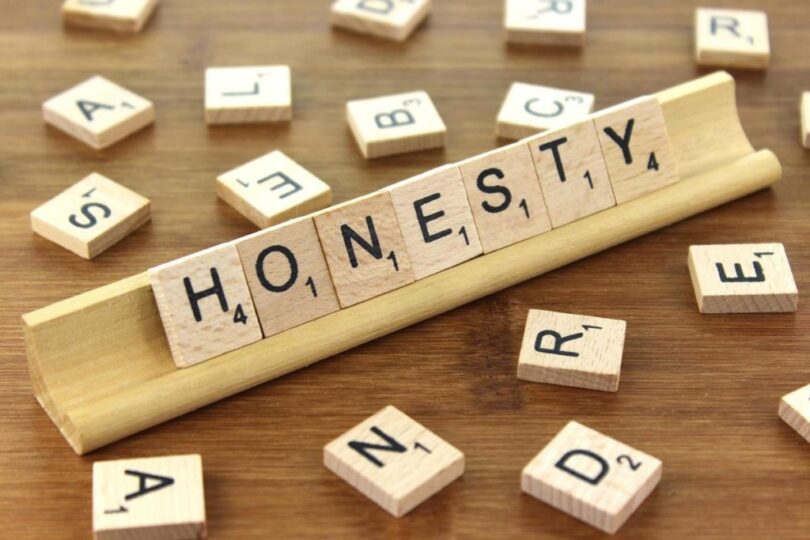“Honesty
means there are no contradictions or discrepancies in thoughts, words, or
actions. To be honest to one’s real self and to the purpose of a task earns
trust and inspires faith in others. Honesty is never to misuse that which is
given in trust.”
Honesty
is a clear conscience “before myself and before my fellow human
beings.” Honesty is the awareness of what is right and appropriate in
one’s role, one’s behavior, and one’s relationships. With honesty, there is no
hypocrisy or artificiality which create confusion and mistrust in the minds and
lives of others. Honesty makes for a life of integrity because the inner and
outer selves are a mirror image.
Honesty
is to speak that which is thought and to do that which is spoken. There are no
contradictions or discrepancies in thoughts, words, or actions. Such
integration provides clarity and example to others. To have one form internally
and another form externally creates barriers and can cause damage, since one
would neither be able to come close to anyone else, nor would others want to be
close. Some think, “I am honest, but no one understands me.” That is
not honest. Honesty is as distinct as a flawless diamond which can never remain
hidden. The worth is visible in one’s actions.
Clouding Issues
Inner
honesty needs to be examined to provide wisdom and support and ensure strength
and stability. Positive firmness within creates an oasis of spiritual
resources, giving confidence to be grounded in one’s self-esteem. That is
assertiveness. If internally there is attachment to a person, object, or idea,
that attachment poses an obstacle to reality and objectivity, and action cannot
be taken in the interest of the whole. The internal state should not be
influenced by the negativity of one’s nature, feelings, or personality traits.
Selfish motives, hidden agendas, and negative feelings and habits are stains on
the mirror of life. Honesty acts as the stain remover.
For
self-growth, there should be cleanliness in one’s efforts and truth in one’s
heart. Cleanliness means exploring and changing consciousness and activity
which blemish the self and raise doubts in others. There should be honesty of
the heart and also honesty of the head; otherwise, there will be self-deception
or a tendency to deceive others by clouding issues with excuses or long-winded
explanations. When the mirror of the self is clean, feelings, nature, motives,
and objectives are clearly visible, and the individual reflects
trustworthiness. There is the saying, “The boat of truth may rock, but it
will never sink.” Even with honesty, the boat sometimes rocks, but
trustworthiness guarantees the boat will not sink. The courage of truth makes
one worthy of trust.
To be
trusted and to trust provide the foundation and cohesion necessary for
untarnished relationships. It is also necessary to share with honesty the
feelings and motives of one another. When there is honesty and cleanliness,
there is also closeness. Without these principles, neither individuals nor
societies can be functional.
Application and Experimentation
Personal
and collective application of such ethics and principles involves experimenting
to see what works best, to see what is meaningful and useful. Such is a
continuous process of application and learning. Progress comes through
experimenting with honesty and implementing it as completely and sincerely as
possible at any given moment. When there is the experience of success,
commitment to honesty and integrity is strengthened. To carry out a task out of
force, compulsion, or with a careless or selfish attitude does not reflect pure
motives. To be honest with one’s real self and true to the purpose of a task
earns trust and inspires faith in others. For progress to be sustained requires
purity of motive and consistency of effort.
An honest person is one who aspires to follow the highest codes of conduct,
who is loyal to the benevolent and universal principles of life, and whose
decisions are based clearly on what is right and wrong. Such an individual
maintains standards which provide guidance and courage to understand and
respect the subtle connections of the world in relation to his or her life. An
honest person appreciates the interconnectedness of the natural world and does
not misuse, abuse, or waste the wealth of resources provided for the well-being
of humanity. An honest person does not take for granted his or her own
resources such as mind, body, wealth, time, talents, or knowledge. Honesty
means never to misuse that which is given in trust. There would always be the
concern that resources be used in a worthwhile way for the basic human, moral,
and spiritual needs of all people. Well-used resources create well-being and
are a means for those very resources to multiply. The individual who is deeply
committed to development and progress keeps honesty as a constant principle in
building a world of peace and plenty, a world of less expenditure and greater
splendor.






